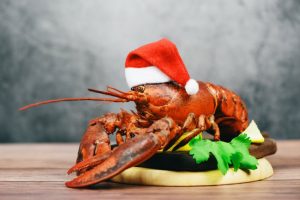
It’s November, which means the holiday season is officially here. Before you know it, your calendar will fill up with holiday parties, work events, and get-togethers with family and friends. At all of these events, there will undoubtedly be lots of sweet treats to indulge in. If you have obstructive sleep apnea, all of this food can actually help alleviate or even exacerbate your disorder. That being said, which foods should you avoid? Which ones should you let yourself enjoy? Below you’ll find a quick guide on foods that affect your sleep apnea.
Sleep-Friendly Foods
Here are some examples of foods that are perfectly fine to indulge in:
1. Melatonin-Rich Foods
Melatonin is a chemical that naturally enhances sleep, and is actually found in many fruits and vegetables. Foods like cherries, cucumbers, broccoli, tomatoes, grapes, and asparagus are all excellent sources of melatonin.
2. Omega-3 Fatty Acids
When you consume a lot of omega-3 fatty acids, it helps your body produce more melatonin. The best place to get omega-3 is in a variety of seafood items, like tuna, salmon, or even shrimp. Now you can justify that shrimp cocktail you’re having at your work holiday party!
3. Tryptophan-Infused Foods
Tryptophan is an amino acid that, when you consume it, gets turned into the neurotransmitter serotonin. Eventually, this is converted into melatonin. You may have heard about tryptophan from turkey being rich in the substance, which is why many people famously take naps after eating a Thanksgiving meal.
Foods to Avoid
These are some examples of foods you should stay away from if you suffer from obstructive sleep apnea:
1. Bananas
While bananas are a healthy source of fiber and potassium, eating bananas may increase mucus production in your mouth and throat, which can worsen your breathing problems.
2. Fatty Meats
Meats like burgers, bacon, lamb, and sausage are all high in saturated fats, which can lead to cardiovascular issues. Heart problems can make your obstructive sleep apnea worse.
3. High-Fat Dairy Products
Just like bananas, high-fat dairy items like whole milk and heavy cheeses can increase your body’s mucus production. Eating too much of them can also cause weight gain, which is another problem that you don’t want if you have sleep apnea.
Final Word
Essentially, if you limit your fat intake this holiday season, you should be able to get quality shut eye. One thing that isn’t on this list because it technically isn’t a food is alcohol. Drinking alcohol a few hours before bed can relax the tissues in the back of the mouth and throat so that they collapse during sleep, increasing your apnea symptoms. Try to keep alcohol consumption to a minimum this holiday season!
Finally, don’t forget that while diet is crucial, so is seeking treatment for your sleep apnea. Be sure to wear your CPAP or oral appliance to bed, even if you travel during the holidays. Keeping all this in mind will lead you to be well-rested as we head into 2020!
About the Author
Dr. J. Peter St. Clair is a certified sleep dentist who has been serving Rowley, MA since 1996. He is a member of many professional organizations, such as the American Academy of Dental Sleep Medicine. His practice offers oral appliance therapy to treat obstructive sleep apnea. If you have sleep apnea and need treatment, you can contact Dr. St. Clear by clicking here.
